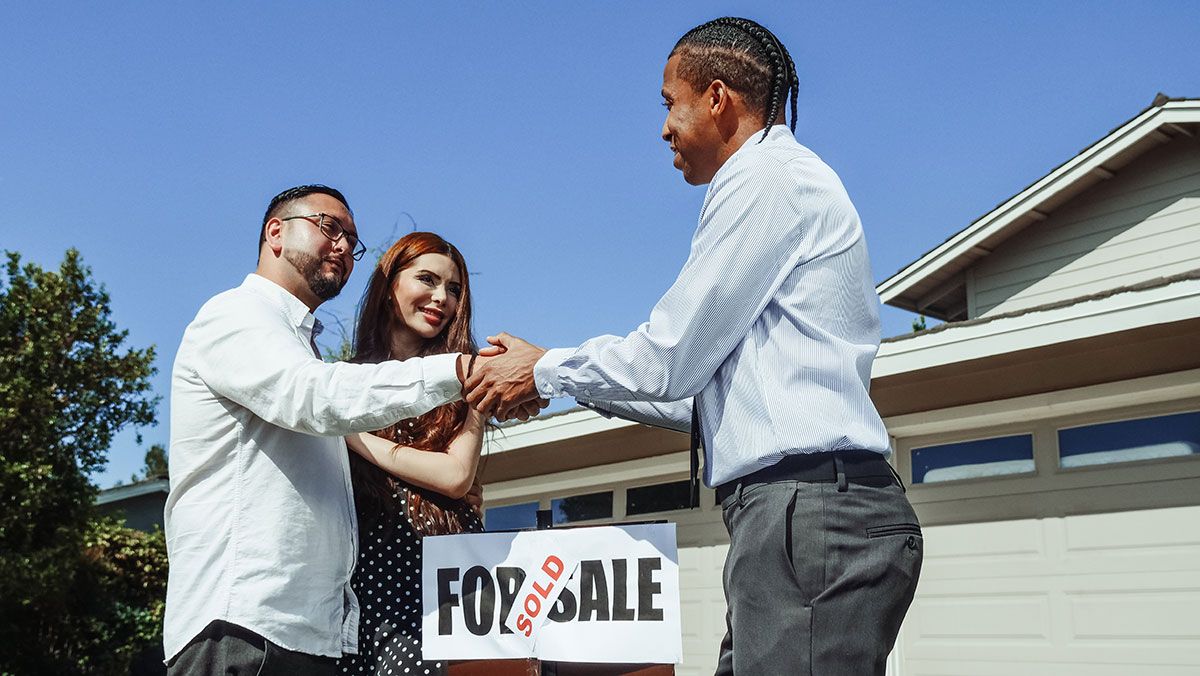Who Pays Closing Costs?

Purchasing a house is expensive – not just for the real estate itself, but also for all the expenses involved in obtaining a mortgage. The total closing costs that must be paid by both the seller and the buyer often come as a surprise to those who aren’t familiar with the process. It’s important to understand who pays the closing costs, including lender fees, taxes, and other expenses.
Closing Costs for Buyers and Sellers
Closing Costs for Buyer
- Appraisal Fee
- Application Fee
- Origination/Underwriting Fees
- Discount Points
- Escrow Funds
- Government Fees
- Title Costs
- Inspection Costs
- Attorney Fees
- Credit Report Fees
Closing Costs for Seller
- Transfer Taxes
- Escrow Fees
- Title Insurance
- Attorney Fees
- Real Estate Agent Commissions
- Seller Concessions
- Prorated Property Taxes
- HOA Fees
- Outstanding Mortgage Balance
All closing costs are broken down into what the seller is expected to pay and what the buyer is expected to pay. However, your costs will vary depending on the terms you agree on with your mortgage lender and the purchase terms worked out between the home buyer and seller. There are a lot of costs you’ll encounter during the closing process, but your lender or realtor should take the time to fully explain these to you.
Closing Costs for Buyers and Sellers

The road to selling or buying a home can be long, from first figuring out how to get a mortgage to then working with a lender, real estate agent, and several other agencies and individuals to make it all come together. For both the buyer and seller, this includes working with a title company, appraisers, underwriters, inspectors, and escrow offices, and may also require paying some attorney fees. All of this adds up to a lot of processing fees and charges all bundled into something called “closing costs.” In most cases, these are broken into seller closing costs and buyer closing costs, but even within these two categories, you’ll see variation.
Closing Costs for Buyer
Appraisal Fee
Nearly all mortgages require an appraisal to extend a loan to a borrower. The lender will order a third party to appraise the value of the property, then use this estimate to calculate the loan-to-value (LTV) ratio which affects how much you’ll be able to borrow. It also reassures the lender that they’re making a good deal and not lending you more than the house is actually worth. Appraisal fees are typically between $300 and $900 and this cost is almost always covered by the buyer.
Application Fee
Not all lenders will charge an application fee, but if they do it will typically be charged before your loan is finalized and shouldn’t be more than $500. This is done to cover administrative expenses on the part of the lender, given that many people start loan applications and never complete them. Additionally, you won’t be refunded this fee if you don’t go through with the loan, which leads many borrowers to simply seek out a lender that doesn’t charge to apply.
The application fee is different from a loan origination fee, which almost all lenders charge. You may also be able to ask your lender to waive this fee, especially if you’re applying for a loan with a bank or credit union you’ve been a customer with for years.
Origination/Underwriting Fees
A loan origination fee (also called a service fee) is usually around 1% of your loan amount. So if you were borrowing $200,000, you can expect to pay around $2,000. This charge goes to the lender to cover underwriting and processing expenses. Since this is one of the largest fees included in your closing cost, it will always be disclosed upfront on your loan estimate. In most cases, this will include underwriting fees, but you may run into a lender who charges the origination fee as a separate line item.
Discount Points
Discount points (also called mortgage points) are an optional part of closing but can lower your interest rate. These are never required, but some borrowers may wish to add them to their closing costs upfront because of the savings they’ll get in the long run with a lower rate. One discount point is equal to 1% of your loan amount, and each point you buy will typically take off around ¼ of a percentage point on your rate.
So, if your loan amount is $250,000 at 5.5%, one discount point would cost you $2,500. If you bought two points for $5,000 you could then drop your rate from 5.5% to 5%. Although there’s no rule about how many points a borrower can buy, it typically won’t go any higher than four, or else the lender would run into federally mandated caps on how much closing costs can be in total.
Escrow Funds
Your escrow account holds funds that are used to pay homeowners insurance, mortgage insurance, your monthly premium, and property tax. Unlike many of the other fees charged at closing, this money remains yours and is simply used to pay expenses that you’d have to pay anyway. Escrow just provides a convenient account to hold the money. There may be an additional escrow fee on top of this but it is typically split with the seller.
At closing, most lenders will want you to put extra money in your escrow account (typically one to two months of your mortgage expenses), but they will only use this account to make payments on your behalf.
Government Fees
Depending on where you’re buying, your city or county will likely charge government fees for every home loan. Usually, this is a recording fee or transfer tax which covers the expense of updating the property ownership records and title and having it officially transferred over to you in your name. This should only be around $125 and is sometimes split with the seller, or the seller will pay the entire fee.
Title Costs
There are a few different fees you may see associated with the title, which is the official document that shows who owns the property and whether there are any liens on it. The first may be for a title search which is helpful to ensure there are no outstanding liens, bankruptcies, or back taxes associated with the property. On its own, this will cost between $200 and $500. However, this service is often done by the lender’s title insurance company since they have a vested interest in making sure the home is being bought and sold free and clear and nobody tries to make an ownership claim on it.
Title costs are typically a one-time fee that cost between $800 and $1,000. You may also wish to purchase title insurance that can protect you years down the line if issues with the title come up, and this will usually cost between 0.5% and 1% of the sale price but it is not required. You may wish to ask the seller to pay this for you if you have concerns over the title.
Inspection Costs
Most buyers will opt to pay for a home inspection as part of their negotiations with the buyer. This can be paid directly to the inspector by the buyer, or it may be wrapped into your closing costs and will run you $400 to $800 depending on your location and the scope of the inspection.
Although a home inspection isn’t required, it’s almost always a good idea to have the home thoroughly evaluated and you can then use this report to negotiate down the purchase price with the seller if you find major concerns. Also, some states may have different rules for home purchases such as requiring a pest inspection, or for some government-backed mortgages like a VA loan or FHA loan.
Attorney Fees
Using an attorney during the closing process is also not typically required but may be beneficial if you have a particularly complicated sale. Some states do require a real estate attorney to be used to write up your final loan and closing documents, but the lender will typically contract with an attorney unless you specifically opt for someone else. Because this will vary so much based on where you live and the complexity of your purchase, the attorney may only be a few hundred dollars or it may be several thousand dollars.
Credit Report Fees
Anytime you apply for a home loan, the lender will run a credit report that pulls from the three largest reporting agencies to evaluate your credit score and history. This small fee (around $25) is almost always the responsibility of the buyer.
Closing Costs for Seller
Transfer Taxes
Transfer taxes are government fees associated with transferring the deed and title of the property from one owner to another, and each state sets its own rate which can range from $40 to over $8,000. There may also be transfer taxes imposed at the city or county level, so you’ll want to ask your lender or realtor what you can expect in your area.
Escrow Fees
The seller is also responsible for working with an escrow company during the sale to ensure mortgage payments, taxes, and insurance premiums are all covered during the transition. Typically the seller and buyer will split this cost which can range from $500 to $3,000 since they’re both responsible for making sure the property is transferred correctly. The seller will usually be responsible for paying these expenses until the closing date at which point the buyer takes on this liability. The escrow company will prorate these costs depending on when in the month your closing date is and hold all the purchase funds to be dispersed according to the agreement.
Title Insurance
Title insurance can be complicated to address since the buyer isn’t required to have it. However, if they do decide it’s warranted the seller is often the one on the hook for paying for it. An owner’s title insurance protects them should any issues come up with the title such as unexpected liens or ownership disputes. And, if the buyer has reason to believe the title may be questioned in the future, they may ask the seller to pay for this insurance as a gesture of goodwill. Costs for title insurance can vary from $1,000 to $4,000.
Attorney Fees
Like the buyer, the seller isn’t required to work with an attorney but they may wish to in certain circumstances. For example, if you’re selling a home that you inherited or one that’s considered a “distressed” property, you may want this additional oversight to ensure your interests are protected and that your contract addresses all potential concerns. In some states (21 in total plus Washington D.C.), you are required by law to have a real estate attorney present when drawing up the purchase documents. Attorneys are typically paid after the home has been sold.
Real Estate Agent Commissions
Most people choose to work with a real estate agent both for buying and selling a home, though either party can do this work as a private sale. The real estate commission makes up a large portion of the seller’s closing fee because they’re usually covering the commission for both agents. This rate will vary but typically falls within 4% to 6% of the purchase price. The funds are usually taken out of the proceeds of the sale. This fee is split between the two agents and can be negotiated.
Seller Concessions
Seller concessions are optional but are much more prevalent in a buyer’s market when sellers are competing for offers. With this, the seller may offer upfront to pay for some of the buyer’s closing costs or offer to cover repair costs for anything found during the home inspection. In general, a buyer and seller can agree to any terms they like, but when the buyer is purchasing with a mortgage, their lender may have certain limitations on whether a seller concession is allowable. For example, most government-backed loans will limit the amount a seller can contribute to the buyer’s closing costs. Or, if the buyer is receiving closing cost assistance, they may be barred from accepting a seller concession.
Prorated Property Taxes
During a home sale, both parties must ensure that the property tax payments are uninterrupted. To do this, the escrow company will prorate the number of days the seller still owns the house (regardless of whether they’re actually living there) and only charge them through the closing date, at which time the buyer must start paying.
HOA Fees
If the property is part of a homeowner association (HOA), there will likely be an HOA fee to transfer the policy over to the new owner. This also ensures that the seller is current on all their HOA dues, and the cost will vary depending on where you live.
Outstanding Mortgage Balance
Of course, if you’re the seller and you currently have a mortgage on your house you’ll be responsible for paying off the outstanding balance. This is almost always taken care of once the sale goes through by using the proceeds to pay your closing costs and the mortgage balance. However, if you were underwater on your home (meaning you owed more than it was worth), you may have to make up the difference to meet your debt obligation.
Are Closing Costs Negotiable?

Yes, certain real estate closing costs are negotiable, but this can be heavily influenced by the location and current market. Also, know that average closing costs vary widely from one state to the next. For example, states like South Dakota, Missouri, and Indiana all have very low averages around $1,500 to $2,000 for buyers. Other states like New York, Delaware, and Washington D.C. have closing costs that can be over $15,000. Keep in mind these are charges in addition to your down payment and will be due upon closing your loan. This means you’ll either have to have the cash on hand or fold these costs into your loan.
As the seller, you should be prepared to pay even more, roughly 6% to 10% of the sale price of the home. The good news is these costs can be negotiated. One of the biggest ways for sellers to cut down on their costs is to forgo working with a real estate agent, which is one of your biggest expenses. Instead, you’d have to do a for-sale-by-owner (FSBO) which is a lot of work, but can be done under the right circumstances. You might consider this option if you already have a buyer lined up and have agreed on a purchase price, or if you need to sell your house fast. Note that you’ll still be responsible for paying the agent commission for the buyer.
Sellers may also be able to request a lower title insurance rate if you’ve lived in your home for less than 10 years. Since these policies cover the entire time you’ve lived in your home, if you’ve only been there a few years, most providers will be able to offer you a lower reissue rate.
Both the seller and the buyer can negotiate the real estate commission with their agents. The total commission is typically 4% to 6% with each agent taking roughly half, but they may be willing to drop their take by even half a percent. There are also discount brokers that offer substantially lower listing rates (around 2%), but this comes with limited services. Before you sign up for this option, make sure you fully understand the services provided and whether there are additional fees or duties you’ll be responsible for that may have been included in the commission for a traditional agent.
Compare Escrow and Title Companies
You can also shop around for escrow and title companies. In most cases, a lender will have their own preference on whom they work with, but you can decide to use a different company since they’ll all have different pricing structures.
Buyers may also qualify for a federal or local closing cost assistance program which may cover your costs completely or extend a loan to you for the money at an especially low rate. Check out local first-time homebuyer programs or government-run programs through the Federal Housing Finance Agency (FHFA), but they may only be available for certain types of mortgages.
No-Closing-Cost Mortgage
Another option that won’t actually decrease your closing costs is to ask your lender to roll them into your loan. This is commonly called a no-closing-cost mortgage. Then, instead of paying the closing costs all at once, your monthly mortgage premium will be adjusted to include this amount. For example, if your loan is for $300,000 and your closing costs were $8,000, your new loan balance would be $308,000. This is a good option if you’re having trouble coming up with the cash, but it should be noted you’ll actually end up paying more since you’ll now be charged interest.
Who Pays Closing Costs?
One of the best (and easiest) ways to cut down on your closing costs as a buyer is to ask your seller to pay for all or a portion of them. You’ll have better luck with this strategy if you’re in a buyer’s market and especially if you have a motivated seller.
No matter which way you look at it, buying and selling a home is expensive and the total amount of closing costs may come as a surprise to many. To a certain extent, you’ll simply have to accept these as the cost of doing business, but in other circumstances, you may be able to reduce them significantly. Once you know what to expect as both the buyer and seller, you can plan and budget accordingly.